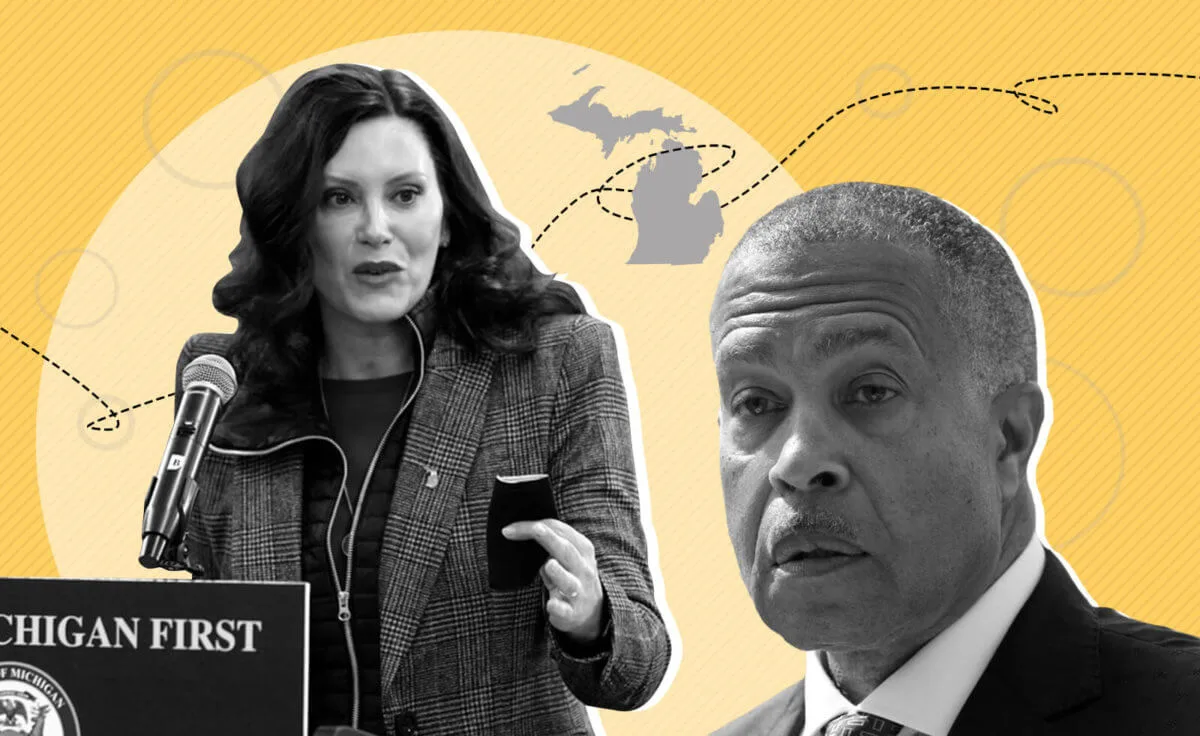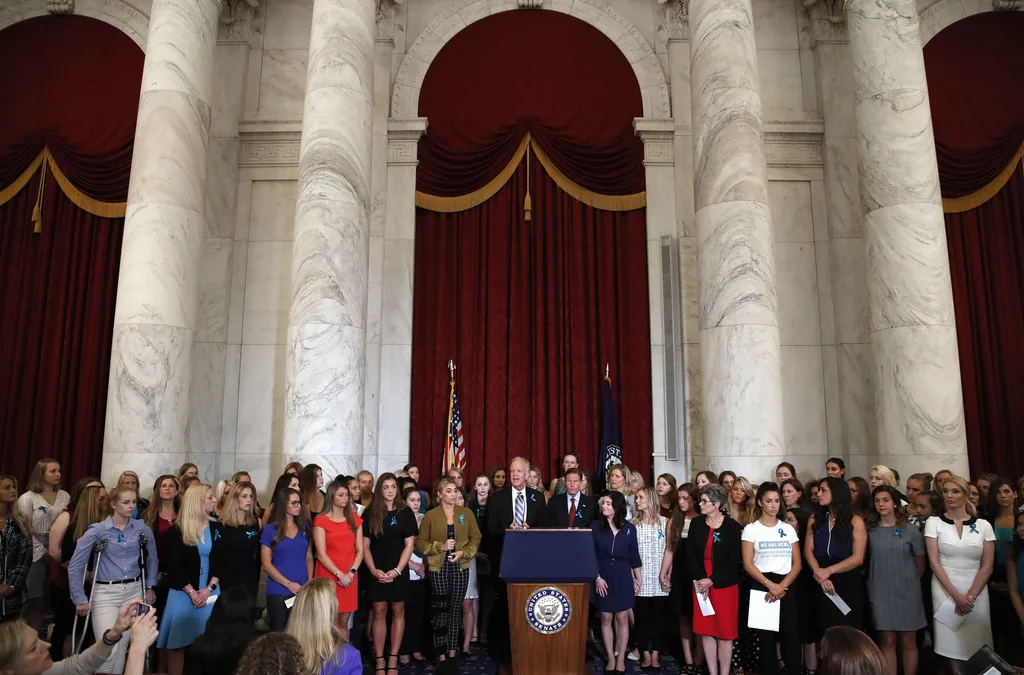
James Craig has attacked Gretchen Whitmer’s campaign fundraising. Here’s a fact check on some of his claims.
LANSING, Mich.—It’s an election year, which means you can expect to see and hear political candidates asking for your vote in every other television and radio advertisement between now and Nov. 8. But it also means that, in addition to asking for votes, candidates will be asking for donations to their campaigns down the stretch.
With that comes an important topic, tied tightly to campaign fundraising and donations: transparency. And while one candidate has thrown stones at another through false claims of fundraising abuse, the glass house around them has failed to cover questionable activity in their own campaign.
James Craig, ostensibly the leading Republican candidate opposing Michigan Gov. Gretchen Whitmer in her bid for reelection, has said that Whitmer has used illegal means to raise exorbitant amounts of cash for her political campaign. In truth, Whitmer’s campaign has accepted donations through legal channels and was officially cleared of any purported wrongdoing in December, when state campaign finance officials ruled that the Whitmer campaign did not violate state laws when it accepted donations exceeding fundraising limits.
Craig in campaign emails has raised several inaccurate thoughts about the governor’s campaign fundraising. Craig’s campaign claimed that Whitmer used a loophole to accept “UNLIMITED campaign donations.”
“Talk about ‘rules for thee but not for me!’” one email reads.
However, what the Craig campaign hasn’t said to its supporters is that while the Whitmer campaign has raised millions of dollars over what it normally would have been able to during a typical race, it is returning the excess money as it is legally required to—a note the campaign has been transparent about throughout the last several weeks.
That excess money comes from donations from people who normally wouldn’t have been able to give as much to the campaign. It was, in this instance, because of several recall efforts aiming to boot Whitmer from office, filed by Michigan Republicans.
All of those contributions, however, will be reported at the next campaign finance statement, due later this month, Whitmer’s campaign lawyer Chris Trebilcock told the Board of State Canvassers Monday, according to The Detroit News.
A Much Needed Distraction?
While Craig takes shots at Whitmer, he does so while dealing with his own campaign’s questionable behavior, according to a Michigan watchdog group.
As The ‘Gander reported in September, there have been concerns surrounding the Craig campaign’s possible use of taxpayer money to support his bid for governor.
In August, Craig founded a panel he called the Law Enforcement Action Task Force, or LEAT. The task force assembled elected leaders chosen by Craig, with both legislators and law enforcement officials at the state and county levels. However, on the day of Craig’s contentious announcement on Belle Isle, the function of this task force was called into question for misuse of funds.
Watchdog and analytics group Progress Michigan found, through several Freedom of Information Act requests, evidence that the task force was a means of using taxpayer dollars to support Craig’s campaign.
Craig’s pop shots at Whitmer also come in the wake of his campaign manager John Patrick Yob stepping down. This is an embarrassing move for Craig, according to Charlie LeDuff, a Pulitzer prize-winning reporter with Deadline Detroit. LeDuff writes that the move suggests Yob, a respected and veteran campaign staffer, stepped down when he did because he didn’t feel Craig could finish the race strong.
“Think about it: The guy standing next to Craig is telling the world he doesn’t think Craig has what it takes to get to the finish line,” LeDuff wrote.
Where Does the Money Go?
While the Michigan election rule allows a candidate to raise a near endless amount of money, it also sets forth rules for what to do with the money if those recalls don’t go through.
If an attempt to recall an official fails and they are not removed from office, the extra funds they garnered during their campaign have to be returned or donated, according to a filing by the Michigan Secretary of State office.
“The governor would be required to disgorge any contributions received in excess of the MCFA (Michigan Campaign Finance Act) limits at that time—months before even the April 19, 2022 deadline for Republican gubernatorial candidates to file their nominating petitions,” the filing reads.
The Truth Behind Craig’s Claims
Michigan election laws have certain stipulations that allow candidates to raise more money than they normally would be allowed based on situations that arise during the campaign. One such situation is when a person running for reelection faces a recall while in office.
Whitmer’s campaign has pointed at this rule when targeted by GOP claims that it has accepted too much money. GOP attempts to challenge the rule in court have failed.
Many of the recalls were recently ended after the Michigan Supreme Court struck them down, meaning they can no longer be cited by Whitmer and her team when raising additional funds. In response, the campaign said it plans to disperse those funds. Campaign officials have said previously they plan to do so in January.
Politics

VIDEO: How Michigan public schools survived the pandemic
https://www.tiktok.com/@gandernewsroom/video/7357799499571531050

What to know about Trump’s legal issues
Over the past year, former president Donald Trump has become the center of not one, not two, not three, but four criminal investigations, at both...

Michigan lawmakers look to break (another) state funding record for public schools
Democratic lawmakers are hashing out plans to bring state funding for Michigan’s public schools to another new, all-time high—and ensure teachers...
Local News

Lawyers for Nassar assault survivors have reached $100M deal with Justice Department, AP source says
The US Justice Department has agreed to pay approximately $100 million to settle claims with about 100 people who say they were sexually assaulted...

More Michigan teens could soon take driver’s ed in their own schools
Privatization of driver’s education means that only 38 Michigan high schools offer affordable in-school driving classes for students. New grants...





